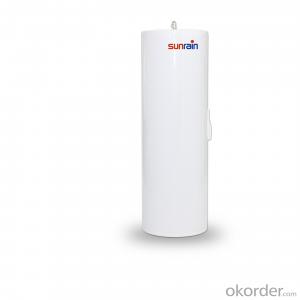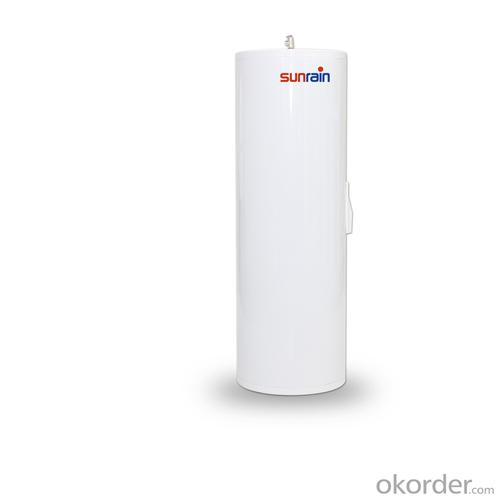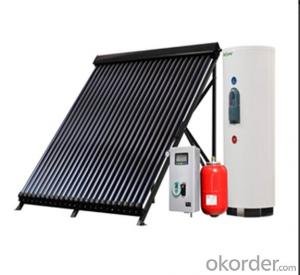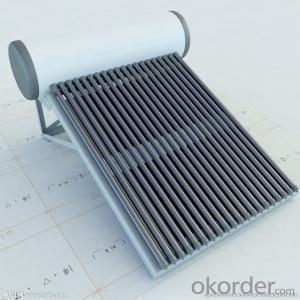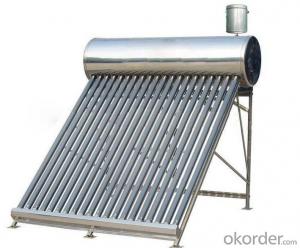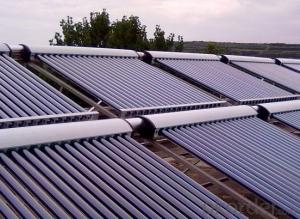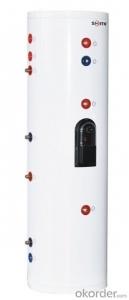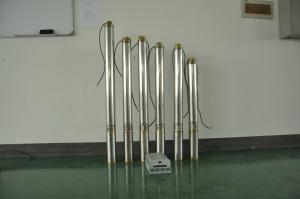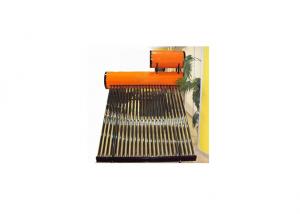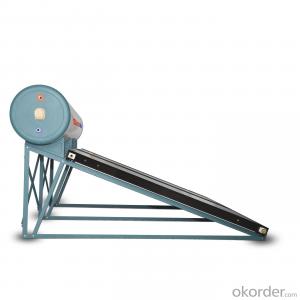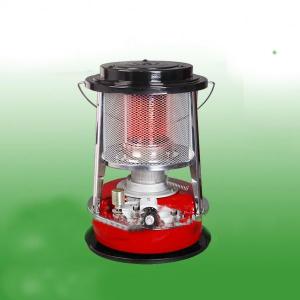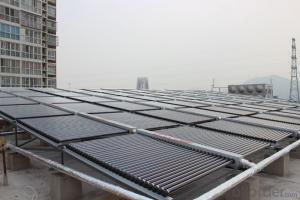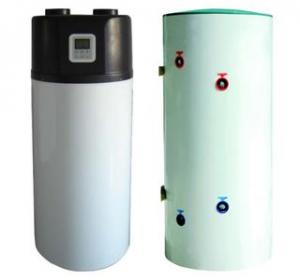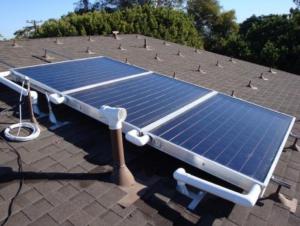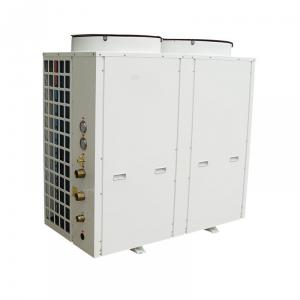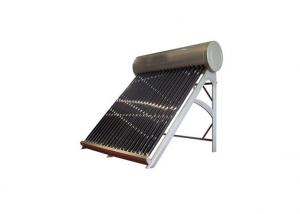Pressurized Double Tank Solar Water Heater for Chicken Coop
- Loading Port:
- China Main Port
- Payment Terms:
- TT OR LC
- Min Order Qty:
- -
- Supply Capability:
- -
OKorder Service Pledge
Quality Product, Order Online Tracking, Timely Delivery
OKorder Financial Service
Credit Rating, Credit Services, Credit Purchasing
You Might Also Like
*Inner tank made by SUS316-1.2mm, pressurized system with stable quality
* Suitable for low quality water supply area, for example, Lebanon
* Thermosiphon circulation between vacuum tubes and tank, better heat transfer quality
* Strong frame
* Automatically replenish the tank by assistant tank
| absorbing area (m2) | 2.755 | 3.310 | 4.142 |
| working pressure (bar) | 4 | ||
| ambient temperature | -10-60℃ | ||
| daily efficiency | >=55% | ||
| empty weight (kg) | 83 | 94 | 118 |
| loading qty (20/40/40HQ) | 32/68/72 | 25/56/60 | 22/46/52 |
- Q: My home is sometimes not as high as the temperature as long as the sun is enough hot water heater, and sometimes it is very hot, but if the cloudy and the like will not be how hot, solar energy is used for light?
- 4, thermal power generation, photovoltaic power generation can, but the cost is very high, and the conversion efficiency is very low (about four dollars per kilowatt), there is a thermal power generation technology is not very mature, is the first light energy is converted to heat, then into electricity, for now still less.
- Q: What is the expected lifespan of the temperature sensors in a solar water heater?
- The expected lifespan of temperature sensors in a solar water heater can vary depending on various factors such as the quality of the sensors, the operating conditions, and maintenance practices. However, on average, temperature sensors in a solar water heater can last anywhere from 5 to 10 years.
- Q: When solar water heater comes into China
- The whole glass tube is in twentieth Century, the first by the United States Owens (Owens) company developed, not the invention of the Chinese invention of the.
- Q: What are the installation requirements for a solar water heater's temperature control system?
- The installation requirements for a solar water heater's temperature control system typically include ensuring proper placement and orientation of the temperature sensors, connecting the control system to the solar collector and storage tank, and integrating it with the existing plumbing system. Additionally, it is important to follow manufacturer's guidelines for wiring and electrical connections, and to ensure that the control system is compatible with the specific solar water heater model being installed.
- Q: Can a solar water heater be used in areas with limited access to biomass?
- Yes, a solar water heater can be used in areas with limited access to biomass. Solar water heaters utilize the sun's energy to heat water, eliminating the need for biomass or any other fuel source. They are a sustainable and environmentally friendly alternative, particularly suitable for areas with abundant sunlight and limited access to other energy sources.
- Q: Can a solar water heater be used in areas with limited access to information or education about solar technology?
- Yes, a solar water heater can be used in areas with limited access to information or education about solar technology. Solar water heaters are relatively simple devices that can be installed and used without extensive knowledge or training. The basic principles of solar water heating can be easily understood and implemented, making it accessible to a wide range of users. In areas with limited access to information or education about solar technology, community-based initiatives can play a crucial role. Organizations, NGOs, or government agencies can conduct awareness campaigns, workshops, or training sessions to educate the local population about the benefits and installation of solar water heaters. These initiatives can help disseminate information and provide hands-on training to those who may not have prior knowledge about solar technology. Furthermore, the use of simple and user-friendly instructional materials, such as visual diagrams or step-by-step guides, can help bridge the information gap and make it easier for individuals to understand and install solar water heaters. Additionally, local technicians or installers can be trained to assist with the installation and maintenance of solar water heaters, ensuring that the technology is accessible to the community even without extensive knowledge or education. Overall, while limited access to information or education about solar technology can pose challenges, the simplicity and accessibility of solar water heaters make them suitable for use in areas with such limitations. With community-based initiatives and the availability of user-friendly materials, solar water heaters can be effectively utilized to provide clean and renewable energy for heating water in these areas.
- Q: To the winter, how to use or maintenance to make solar water heater life.Winter solar water heaters are rarely used, may be the cause of the environment, the water heater is not very hot, I worry about the pipeline would be frozen. How to do it.Some people say that the water in winter to vent, so good?
- Two, there is a simple and practical. The long-term use of the method, you can add a small solar water tank outlet pumping device, when no water
- Q: What certifications or standards should a solar water heater meet?
- A solar water heater should meet certain certifications and standards to ensure its efficiency, safety, and compliance with industry regulations. Here are some important certifications and standards that a solar water heater should meet: 1. Solar Rating and Certification Corporation (SRCC): SRCC is a widely recognized certification organization that evaluates and rates the performance of solar energy systems, including solar water heaters. Their certification ensures that the system meets specific performance and durability criteria. 2. International Organization for Standardization (ISO): ISO has several relevant standards for solar water heaters. ISO 9459-2 provides guidelines for testing and calculating the thermal performance of solar water heaters, while ISO 9806 covers the testing and rating of solar thermal collectors. 3. European Solar Keymark: This certification is specific to the European Union and is a mark of quality and compliance with European standards for solar thermal products. It ensures that the solar water heater meets the required performance and safety standards. 4. National or regional building codes: Solar water heaters should comply with the applicable building codes in the region where they are installed. These codes outline specific requirements for the design, installation, and safety aspects of solar water heating systems. 5. Safety certifications: Solar water heaters should meet safety certifications such as the Underwriters Laboratories (UL) certification in the United States or the TUV certification in Europe. These certifications ensure that the product has undergone rigorous testing to ensure its safety and proper functioning. 6. Energy Star: Although primarily associated with energy-efficient appliances, the Energy Star program also covers solar water heaters. The Energy Star label indicates that the product meets certain energy efficiency criteria, helping consumers identify the most energy-efficient options. By meeting these certifications and standards, a solar water heater demonstrates its quality, performance, and compliance with industry regulations, giving consumers confidence in its reliability and efficiency.
- Q: Are there any financial incentives for installing a solar water heater?
- Yes, there are several financial incentives for installing a solar water heater. These incentives can include federal tax credits, state and local rebates, and utility company incentives. Additionally, installing a solar water heater can significantly reduce energy bills, leading to long-term savings on utility costs.
- Q: Does a solar water heater require a backup power source?
- No, you do not need a backup power source for a solar water heater. Solar water heaters operate independently using energy from the sun, so they do not rely on electricity or other backup power sources. This makes them highly efficient and cost-effective as they use renewable energy and reduce dependence on traditional energy sources. However, if there is prolonged cloudy or rainy weather that limits the amount of sunlight available, the water heater's performance may be affected. In such cases, some solar water heaters may have built-in backup systems or electric heating elements to ensure a continuous supply of hot water. Nevertheless, these backup systems are not necessary for the regular operation of solar water heaters and are only intended for rare situations when the weather conditions are unfavorable.
Send your message to us
Pressurized Double Tank Solar Water Heater for Chicken Coop
- Loading Port:
- China Main Port
- Payment Terms:
- TT OR LC
- Min Order Qty:
- -
- Supply Capability:
- -
OKorder Service Pledge
Quality Product, Order Online Tracking, Timely Delivery
OKorder Financial Service
Credit Rating, Credit Services, Credit Purchasing
Similar products
Hot products
Hot Searches
Related keywords
